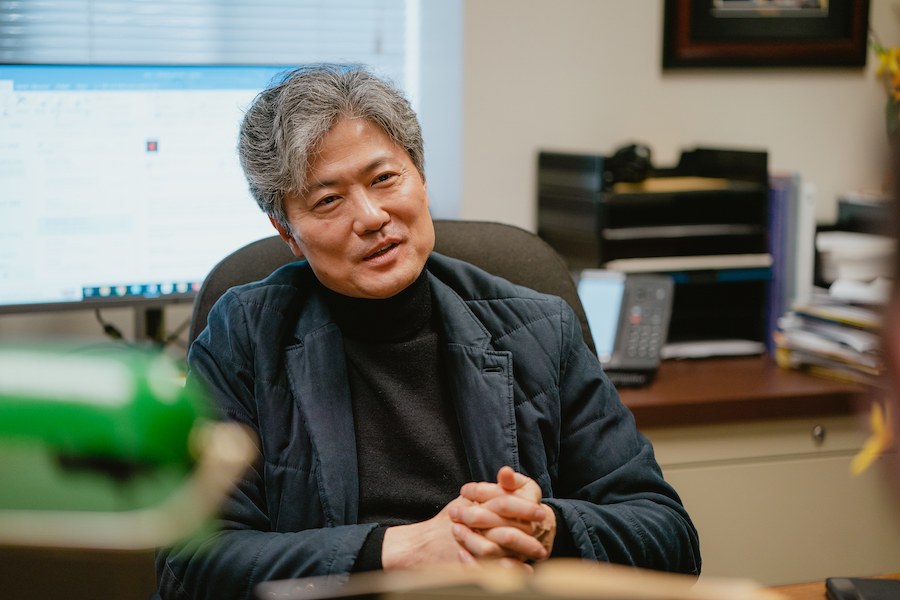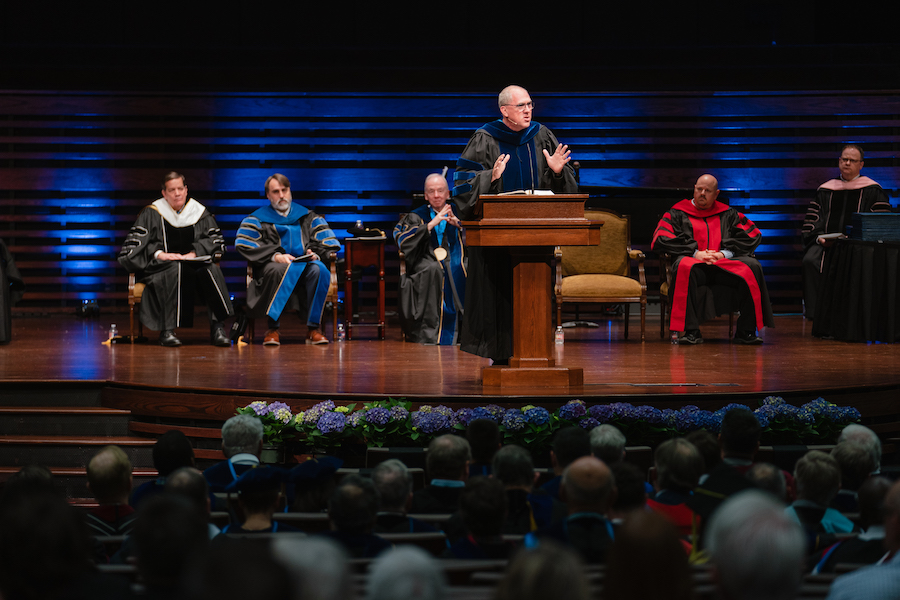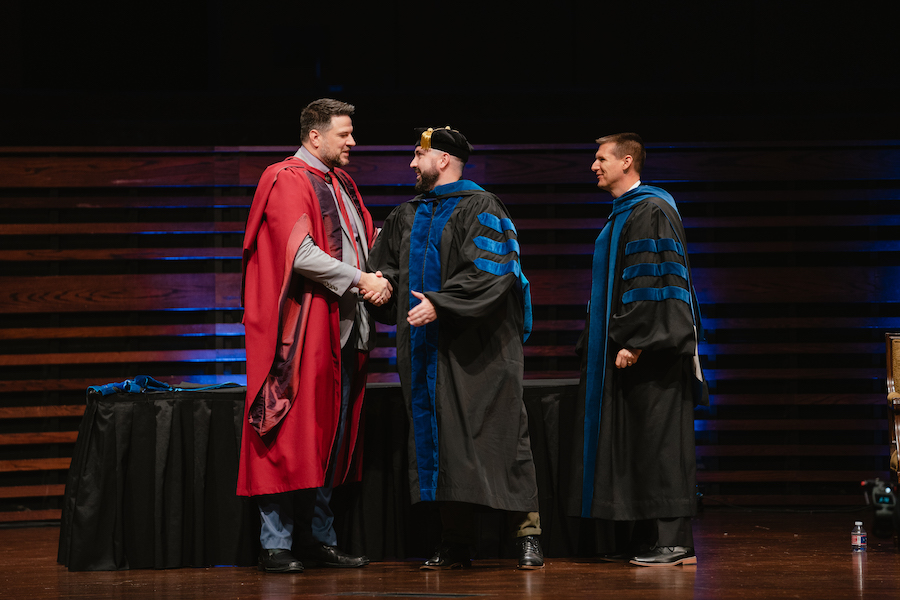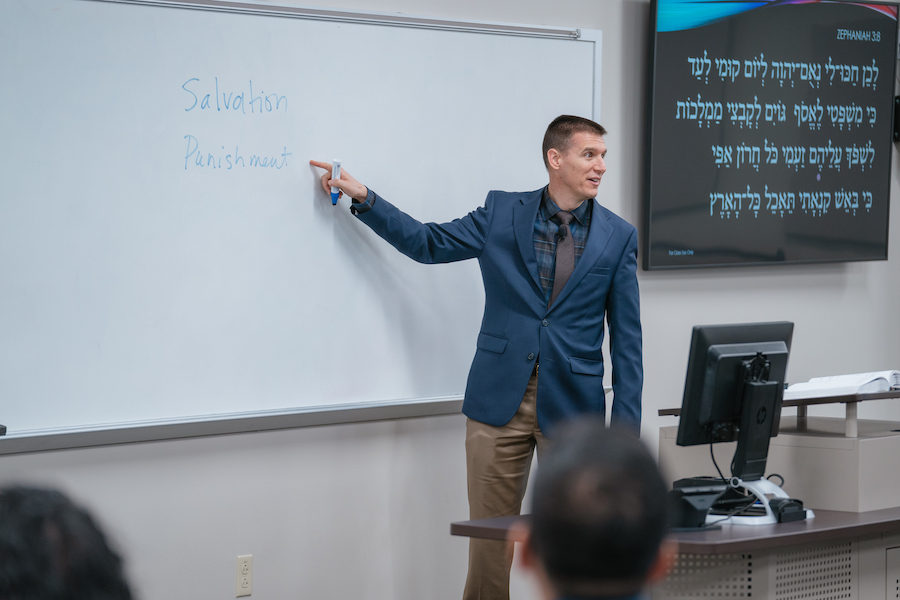Next-Gen ministry: How Doug Bischoff pioneered helping Houston’s First be a ‘better partner for parents’
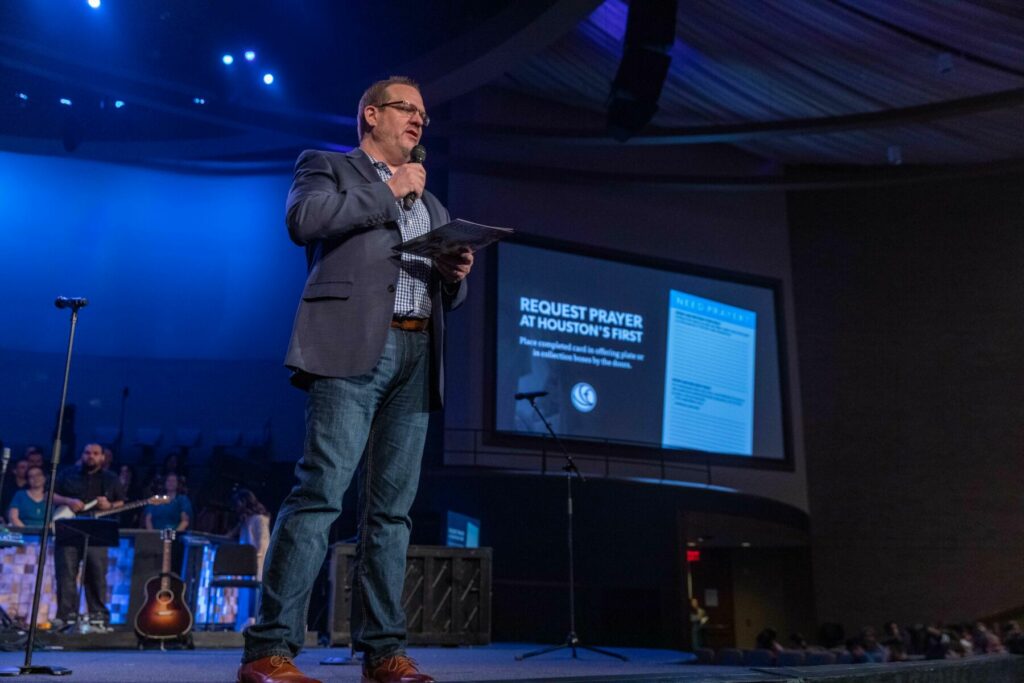
Editor’s note: This article originally appeared in the Fall 2023 issue of Southwestern News.
In most churches today, children’s ministry and youth ministry have little to do with each other outside of sharing a building. At Houston’s First Baptist Church, however, Southwesterner Doug Bischoff has pioneered ministry that seeks to make “church a better partner for parents” throughout their childhood journey.
There is a rise in what some call a “Next-Gen” minister. This new ministerial position is one that connects all the younger-aged ministries together and brings parents closer to what their children are learning. Before, parents could be left in the dark about events or even theology taught to their children: this new position seeks to change that while keeping students at the heart of this new position.
“Adult change is hard,” says Bischoff (’93, ’11), who currently serves as the Next-Gen Minister at Houston’s First Baptist Church in Houston, Texas. “I like kids because kid change is not hard.” Bischoff has been involved with student ministry since he was 21 years old.
Bischoff says he “was one of those kids that was in church nine months before I was born.” The church in which he was reared was Hamlin Baptist Church in Springfield, Missouri. It was “just a great place to grow up in,” says Bischoff. “I was involved in everything.” From there, he went to college at Missouri State University in his hometown of Springfield. After his junior year in college, Bischoff had an internship in computer sciences, his undergraduate major, which helped show his true calling in a way.
“I did an internship in St. Louis, Missouri, and I was bored,” says Bischoff. “I didn’t know anybody there. I would go to work and go back home.”
When he was faced with this boredom, he decided to call someone he knew well. “I called my youth pastor and asked, ‘What do I do?’” His youth pastor, J. C. Beckner (’80), mentioned Oak Ridge Baptist Church in St. Peters, Missouri, which needed help in the area of youth ministry. “He didn’t tell me that the church did not have a youth minister, so I became the youth minister and they let me be the youth minister for seven months,” Bischoff recalls.
After college, Bischoff only had one seminary on his mind where he would further his education. “Southwestern was just the one and only choice for me and it was a perfect choice,” he says. Beckner not only assisted in Bischoff getting into youth ministry, but even encouraged him to go to Southwestern. “He began to tell me about Phil Briggs and Wes Black, and I couldn’t wait to get to a place to hear from those two men,” Bischoff explains, noting influential former faculty members.
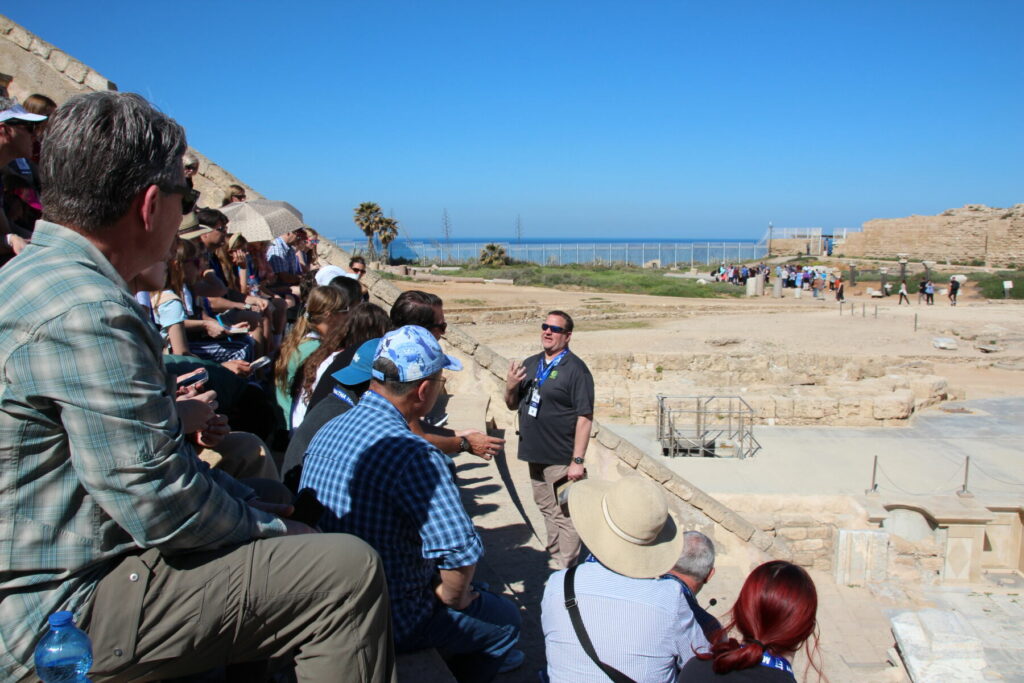
Doug Bischoff, a two-time Southwestern Baptist Theological Seminary graduate, has sought to cultivate next generation ministry at Houston’s First Baptist Church in Houston, Texas, where he serves as Next-Gen Minister. Through this ministry Bischoff seeks to connect younger-aged ministries together and involves parents in what they are learning at church.
Following the encouragement of his high school youth pastor, Bischoff began his Master of Arts in Religious Education with an emphasis in youth ministry in August of 1990. While working on his degree, Bischoff spent two stints of time in Saudi Arabia as a youth minister – once between his second and third years at Southwestern, and again following his graduation in 1993.
Following his time overseas, Bischoff says he “didn’t have a clue” as to what he was going to do with his life. He decided to go back to his home in Springfield and visit family and friends. He met with a friend who had been pastoring a church whose building had been damaged by an arson fire. While going to visit with him and see the damage, Bischoff left with a clear new role for his life, youth minister at Spring Hill Baptist Church in Springfield—the very same church.
“The craziest thing about it is that it was a volunteer” position, says Bischoff. “I’m the guy who went to seminary to get a volunteer job.” The job did not remain volunteer for long, however, and he became a part-time youth minister there after six months. “I was in conversation with a church in Alabama at that time about being full time and I just knew that God wanted me in Springfield at this little church.”
“It was a church of about 125 people, so not even the pastor was full-time,” Bischoff remembers. He stayed at Spring Hill Baptist Church for 12 years, full-time for 10 and a half of those years. “The church grew from 125 members to 1,000 in about six years,” he says. When people would ask Bischoff how their church was growing so quickly, his response was always the same, “I don’t know. God’s just doing it, and we’re trying to stay out of His way.”
During his time at Spring Hill Baptist, Bischoff met and married his wife, Wendy, and had all four of his children there. Bischoff reflects, “It was just an incredible 12 years.” After being at the church for 10 years, the pastor left, and Bischoff became the interim pastor for two years. The role solidified his call and passion for youth ministry. “I just couldn’t wait to get back to the students,” Bischoff recalls. “It just was not how God wired me,” he explains.
Though Bischoff has many years of experience in youth and student ministry, he did learn much of what he knows from professors at Southwestern. During his first stint at Southwestern, he learned from the late Briggs, professor of student ministry, and Black (’78, ’85), retired professor of student ministry, that “youth ministry could be a career,” he says. He explains they taught “there is a depth to youth ministry beyond games and camp. They taught me that depth, they taught me the why behind so many things about kids and the development of adolescence.”
When Bischoff returned to Southwestern to begin working on his Doctor of Philosophy in 2005, he was able to learn the same information at a deeper level from a different professor, Richard Ross (’74, ’80), senior professor of student ministry. “It was the same thing, second verse in that it was deepening, again, my understanding of student ministry.” With bringing in 20 years of experience to his Ph.D. studies, Bischoff was in an unfamiliar place. However, he did know what he wanted. “I wanted to learn more, and I wanted to learn it from Dr. Ross.” Bischoff graduated with his Ph.D., majoring in student ministry, in 2011.
Ross says, “Every day Doug presses to know how to redeem, fully transform, and send out young believers.” Ross says Bischoff’s work in ministry reflects that Next-Gen and student ministry are “more than a job description” they are “the passion of his life.” Though Bischoff has made a large impact in his ministry at Houston’s First, Ross believes that his ministry goes “beyond the church,” as “his master’s and Ph.D. studies have prepared him to make a wider impact on Next-Gen ministries in many other congregations.”
Bischoff wrote his doctoral dissertation on the impact of mission service on adolescent identity. While still at Spring Hill Baptist Church, he got connected with William Taylor (’83) who was the missions director at Southwest Baptist University. “William took college students every year to this far off place called Houston, Texas. Through that, I began to include my high school students,” he remembers.
During his time at Spring Hill, they would take students to four different mission opportunities, “which is a lot for a small church.” The students went to Chile and even as far as Uganda. Recalling a story of a student who experienced a call to ministry during a mission trip to Uganda, Bischoff says, “He got up to preach and got an incredible response. He came up to me afterwards and said, ‘I want to do that again.’ He ended up planting and pastoring a megachurch in Houston.”
Through missions, students can “see their ministry giftings,” says Bischoff. “Missions is not about creating missionaries vocationally. Missions is about kids understanding how they’re wired.” He recalls another student who felt a calling on their life on that same trip to Uganda. “He’s an accountant and is a godly man who leads mission trips,” Bischoff says, explaining that “he learned his organizational and administrative gifts on that trip.” After joining the staff of Houston’s First Baptist Church in 2007, Bischoff helped implement a missional focus on students that spans from fourth grade to high school graduation and includes five events “that are meant to build upon each other so that the kids can learn who they are in Christ and how God has wired them.”
Bischoff credits the long legacy of student ministry at Houston’s First to Johnny Derouen (’93, ’05), former professor of student ministry at Southwestern Seminary. “Johnny started a legacy in the 80’s that I was aware of, and it was just really exciting for me to be a part of,” he explains.
After spending around seven years as the youth minister, Bischoff was called to be the Next-Gen Minister. “I talked about it more and more with my peers, and my supervisor, about [how] we could build a better discipleship program for parents.” In 2013, he says his church told him, “Okay, great. You get to be the Next-Gen and make all that happen.” Bischoff says he “didn’t have a clue” what he was doing as he was “just making it up as I go along” because he is the first Next-Gen minister “the church has ever had” and he was “just trying to find ways to make church a better partner for parents.”
To Bischoff, establishing the church as a good partner for parents means “helping parents know what we’re teaching so they can reaffirm it at home.” Communication can be an issue in churches, but especially in large churches. “So, we’re trying to diminish frustration. We’re trying to put resources into the hands of parents,” he explains.
“We are not kid experts, but we are kid specialists,” Bischoff says when discussing why it is important to involve parents so heavily in ministry. “A parent is the expert of their kid; nobody knows their child better. And we as a church are not going to try to pretend like we’re the expert on their child.” Bischoff is still working with youth and student ministry, but he wants to emphasize the importance of children being discipled at home. He also believes in the importance of training up the next generation of church leaders.
Through a collaboration between Houston’s First and Southwestern, called the Difference Maker Institute, which launched in August, students can enter into a year-long residency program that allows them to earn 18 hours of seminary credit while getting real-life ministry experience at Houston’s First. The students, who moved to Houston, have seminary classes chosen for them by the church staff, and “the application will be done by us here in our church staff,” he explains.
To Bischoff, Next-Gen ministry is about more than just student ministry. “I love as a Next-Gen minister, to some extent, pastoring my team,” he explains as he believes “part of my job is just pastoring my team and loving my team and reminding them who they are in Christ and what God has designed them to do.” Bischoff is the Next-Gen minister at the main campus of Houston’s First, but he is also critical in helping with providing direction for the church’s other three campuses as he is the first and only Next-Gen minister among the campuses of the congregation.
Bischoff has seen his role, and student ministry as a whole, change over his time in ministry. While many things change over time, Bischoff’s heart and calling still remain in growing up the next generation of church leaders and disciples. His hope, in the end, is that more people will come to know Christ for the generations to come.
James Dugger (’23) is a news writer for Southwestern News.
Photos for this article were provided by Houston’s First Baptist Church.
